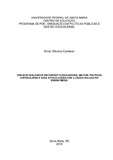| dc.creator | Cardoso, Silvia Silveira | |
| dc.date.accessioned | 2019-03-21T17:36:44Z | |
| dc.date.available | 2019-03-21T17:36:44Z | |
| dc.date.issued | 2018-07-10 | |
| dc.identifier.uri | http://repositorio.ufsm.br/handle/1/15946 | |
| dc.description.abstract | The present work has as central theme the relationship between curricular policies
and the English language (LI) in high school. The main objective of this research is to
understand the production of meanings in the relation between curricular policies and
the English language, considering the implications for educational processes in high
school. The educational institution where the research was carried out is a federal
school located in the Western region of the city of Santa Maria, RS. The methodology
used to develop this study contemplates a qualitative research-action approach. As a
data source, investigative-formative dialogues were conducted with English-speaking
teachers who develop pedagogical actions in high school. In order to base this
research, the studies of the following authors were used as theoretical reference:
Bardin (2011), Kuenzer (2013), Leffa (1999), Lopes e Macedo (2002), Minayo
(2007), Saviani (2007). It has been found that investigating and discussing the
English curriculum policies is fundamental, since it is perceived that teaching-learning
has proved to be fragile, not reflecting meaningful learning from the students. From
the dialogical practices, the educators evidenced the innumerable gaps and
contradictions permeated by political questions that end up in the emptying of the
social function of the LI as discipline in the school curriculum. Thus, as a product of
this research, a group of studies was created in the Military School with the title of
"Investigative-Formative Dialogical Circles at Wagon College", so that we could
continue the dialogic and reflexive practices within the school environment. | eng |
| dc.language | por | por |
| dc.publisher | Universidade Federal de Santa Maria | por |
| dc.rights | Attribution-NonCommercial-NoDerivatives 4.0 International | * |
| dc.rights.uri | http://creativecommons.org/licenses/by-nc-nd/4.0/ | * |
| dc.subject | Políticas curriculares | por |
| dc.subject | Língua inglesa | por |
| dc.subject | Ensino médio | por |
| dc.subject | Curricular policies | eng |
| dc.subject | English language | eng |
| dc.subject | High school | eng |
| dc.title | Círculos dialógicos em contexto educacional militar: políticas curriculares e suas articulações com a língua inglesa no ensino médio | por |
| dc.title.alternative | Dialogical circles in a military educational context:curricular policies and articulations with the english language in high school | eng |
| dc.type | Dissertação | por |
| dc.description.resumo | O presente trabalho possui como temática central a relação entre as políticas
curriculares e a língua inglesa (LI) no ensino médio. A pesquisa apresenta como
objetivo geral, compreender a produção de sentidos na relação entre políticas
curriculares e a língua inglesa, considerando implicações para processos educativos
no ensino médio. A instituição educacional onde a pesquisa foi realizada trata-se de
uma escola federal, localizada na região Oeste da cidade de Santa Maria, RS. A
metodologia utilizada para desenvolver este estudo contempla uma abordagem
qualitativa do tipo pesquisa-ação. Como fonte de dados, foram realizados círculos
dialógicos investigativo-formativos com os professores de língua inglesa que
desenvolvem ações pedagógicas no ensino médio. Para fundamentar esta pesquisa,
os estudos dos seguintes autores foram utilizados como referencial teórico: Bardin
(2011), Kuenzer (2013), Leffa (1999), Lopes e Macedo (2002), Minayo (2007),
Saviani (2007), entre outros. Constatou-se que investigar e discutir as políticas
curriculares de língua inglesa no currículo do ensino médio é fundamental, pois se
percebe que o ensino-aprendizagem tem se mostrado frágil, pouco repercutindo em
uma aprendizagem significativa por parte dos educandos. A partir das práticas
dialógicas, os educadores evidenciaram as inúmeras lacunas e contradições
permeadas por questões políticas que acabam resultando no esvaziamento da
função social da LI enquanto disciplina no currículo escolar. Dessa forma, como
produto desta pesquisa, foi criado um grupo de estudos dentro do Colégio Militar
com o título de “Círculos Dialógicos Investigativo-Formativos no Colégio do Vagão”,
para que pudéssemos dar continuidade às práticas dialógicas e reflexivas dentro do
ambiente escolar. | por |
| dc.contributor.advisor1 | Sarturi, Rosane Carneiro | |
| dc.contributor.advisor1Lattes | http://lattes.cnpq.br/4133511150582100 | por |
| dc.contributor.referee1 | Lunardi, Elisiane Machado | |
| dc.contributor.referee1Lattes | http://lattes.cnpq.br/8366108604553867 | por |
| dc.contributor.referee2 | Kader, Carla Callegaro Corrêa | |
| dc.contributor.referee2Lattes | http://lattes.cnpq.br/1224256355766695 | por |
| dc.contributor.referee3 | Costa, Joacir Marques da | |
| dc.contributor.referee3Lattes | http://lattes.cnpq.br/4415592608164551 | por |
| dc.creator.Lattes | http://lattes.cnpq.br/5386737664022940 | por |
| dc.publisher.country | Brasil | por |
| dc.publisher.department | Educação | por |
| dc.publisher.initials | UFSM | por |
| dc.publisher.program | Programa de Pós-Graduação em Políticas Públicas e Gestão Educacional | por |
| dc.subject.cnpq | CNPQ::CIENCIAS HUMANAS::EDUCACAO | por |
| dc.publisher.unidade | Centro de Educação | por |



